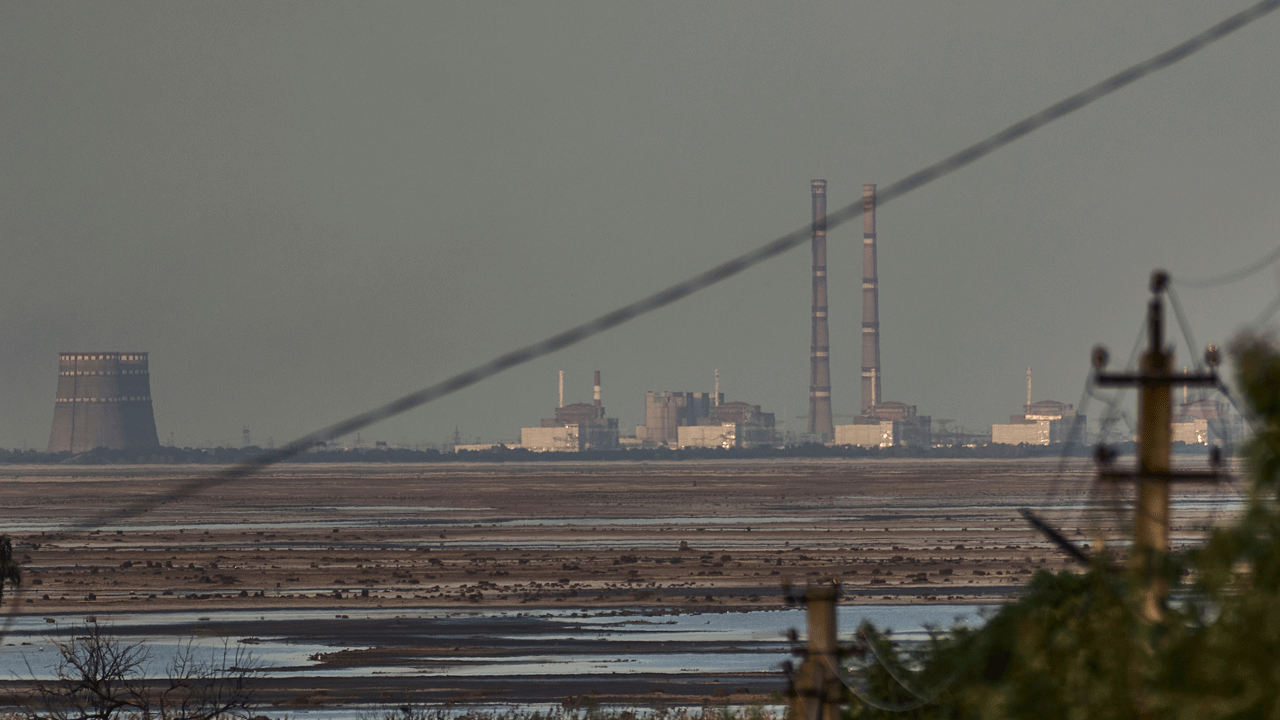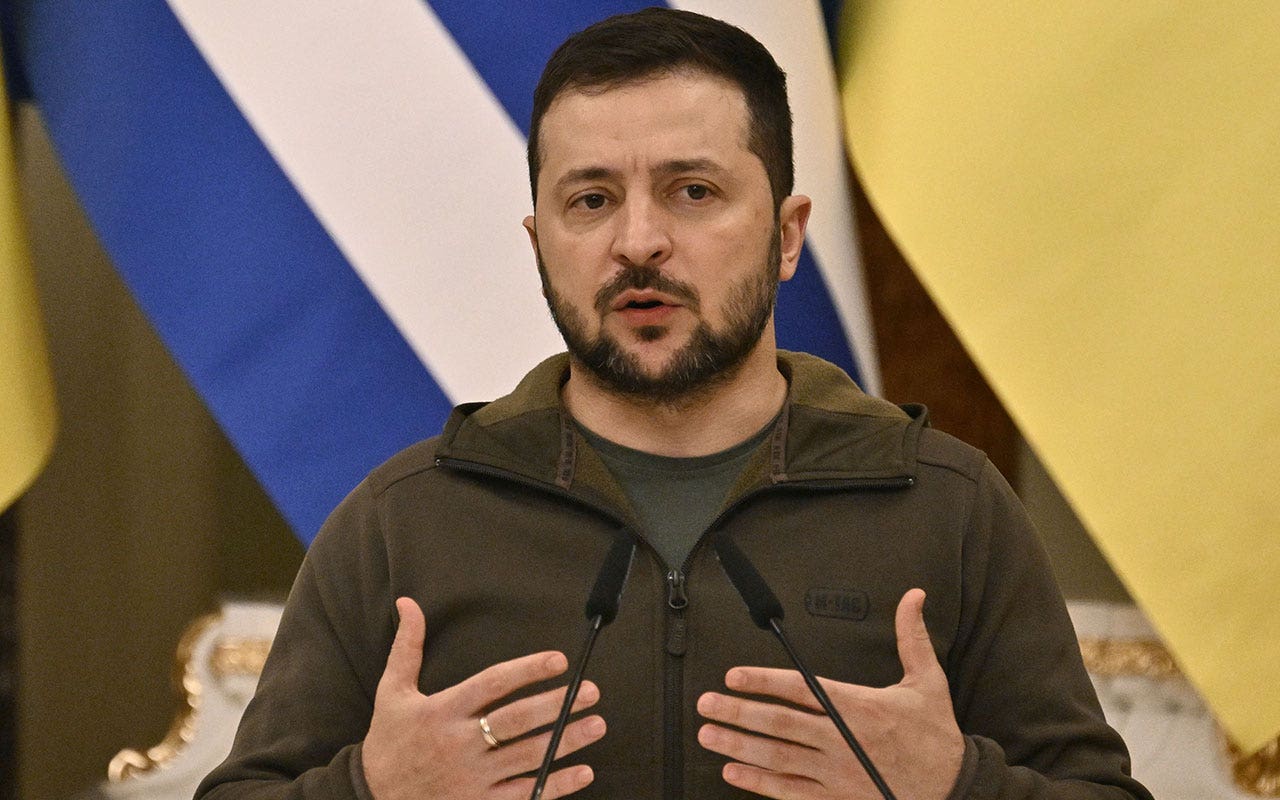World
IAEA warns that attacks on a nuclear plant in Russian-controlled Ukraine put the world at risk

UNITED NATIONS (AP) — Russia and Ukraine on Monday traded blame before the United Nations Security Council for the attacks on Europe’s largest nuclear power plant, which the head of the International Atomic Energy Agency said have put the world “dangerously close to a nuclear accident.”
Without attributing blame, IAEA Director General Rafael Mariano Grossi said his agency has been able to confirm three attacks against the Zaporizhzhia Nuclear Power Plant since April 7.
UKRAINE DENIES RUSSIAN CLAIM OF DRONE STRIKES ON EUROPE’S LARGEST NUCLEAR PLANT
“These reckless attacks must cease immediately,” he told the Security Council. “Though, fortunately, they have not led to a radiological incident this time, they significantly increase the risk … where nuclear safety is already compromised.”
The Zaporizhzhia nuclear power plant, Europe’s largest, is seen in the background of the shallow Kakhovka Reservoir after the dam collapse, in Enerhodar, Russian-occupied Ukraine, Tuesday, June 27, 2023. Officials at the Russian-controlled Zaporizhzhia Nuclear Power Plant said that the site was attacked on Sunday, April 7, 2024, by Ukrainian military drones, including a strike on the dome of the plant’s sixth power unit. (AP Photo/Libkos)
The remote-controlled nature of the drones that have attacked the plant means that it is impossible to definitively determine who launched them, Grossi told reporters after the meeting.
“In order to say something like that, we must have proof,” he said. “These attacks have been performed with a multitude of drones.”
Zaporizhzhia sits in Russian-controlled territory in southeastern Ukraine and has six nuclear reactors.
Fears of a nuclear catastrophe have been at the forefront since Russian troops occupied the plant shortly after invading in February 2022. Continued fighting between Russian and Ukrainian forces — as well as the tense supply situation at the plant — have raised the specter of a disaster.
Ukraine and its allies on Monday again blamed Russia for dangers at the site, with the United States saying, “Russia does not care about these risks.”
“If it did, it would not continue to forcibly control the plant,” U.S. deputy ambassador Robert Wood told the Security Council, which met at the initiative of the U.S. and Slovenia.
Russia, for its part, said Ukraine was to blame for the attacks.
“The IAEA’s report does not pinpoint which side is behind the attacks,” Russia’s U.N. Ambassador Vassily Nebenzia said. “We know full well who it is.”
“Over the last few months, such attacks not only resumed,” Nebenzia said, “they significantly intensified.”
Ukraine’s ambassador to the U.N., Sergiy Kyslytsya, called the attacks “a well-planned false flag operation by the Russian Federation,” which he alleged Russia had designed to distract the world from its invasion of its neighbor.
The Zaporizhzhia facility is one of the 10 biggest nuclear plants in the world. Fighting in the southern part of Ukraine where it is located has raised the specter of a potential nuclear disaster like the one at Chernobyl in 1986, where a reactor exploded and blew deadly radiation across a vast area.
Neither Russia nor Ukraine in recent months has been able to make significant advances along the 1,000-kilometer (620-mile) front line crossing eastern and southern Ukraine. Drones, artillery and missiles have featured heavily in what has become a war of attrition.
Russia and Ukraine have frequently traded accusations over the Zaporizhzhia plant.
The most recent strikes did not compromise the facility, which is designed to withstand a commercial airliner crashing into it, the IAEA said.
The plant’s six reactors have been shut down for months, but it still needs power and qualified staff to operate crucial cooling systems and other safety features.

World
Hamas delegation due in Cairo on Monday for Gaza ceasefire talks

World
Ukraine's Zelenskyy urges faster US weapon deliveries

- President Volodymyr Zelenskyy said on Monday that U.S. weapons have begun to arrive in Ukraine.
- Zelenskyy voiced the urgency of accelerating the process due to advancing Russian forces attempting to exploit the situation.
- He also mentioned the lack of significant positive developments in timely support for the Ukrainian army.
President Volodymyr Zelenskyy said on Monday that vital U.S. weapons were starting to arrive in Ukraine in small amounts.
He said that the process needed to move faster.
This is the result of advancing Russian forces trying to take advantage.
REPORTER’S NOTEBOOK: UKRAINE’S ZELENSKYY OPENS UP ON US AID, ISRAEL, TRUMP
Zelenskyy spoke during a joint news conference in Kyiv alongside visiting NATO chief Jens Stoltenberg.
President Volodymyr Zelenskyy said on Monday that vital U.S. weapons were starting to arrive in Ukraine in small amounts and that the process needed to move faster as advancing Russian forces were trying to take advantage. (GENYA SAVILOV/AFP via Getty Images)
During the conference, he said the situation on the battlefield directly depended on the speed of ammunition supplies to Ukraine.
“Timely support for our army. Today I don’t see anything positive on this point yet. There are supplies, they have slightly begun, this process needs to be sped up,” he said.
World
Nine on trial in Germany over alleged far-right coup plot

Nine people charged with terrorism in connection with an alleged far-right plot to topple the German government went on trial on Monday in one of three linked cases.
The trial – which opened on Monday in Stuttgart – is the first to open in relation to the purported conspiracy, which came to light in late 2022. It is focused on those defendants of the Reich Citizens group who allegedly were part of its so-called military arm, German news agency dpa reported.
Federal prosecutors in December filed terrorism charges against a total of 27 people, one of whom has since died.
Nine other suspects, among them a self-styled prince and a former far-right lawmaker, will go on trial on 21 May at a Frankfurt state court in the most prominent of the three cases. The other eight will go on trial in Munich on 18 June.
On trial in the Frankfurt case includes Heinrich XIII Prince Reuss, whom the group allegedly planned to install as Germany’s provisional new leader; Birgit Malsack-Winkemann, a judge and former lawmaker with the far-right Alternative for Germany party; and a retired paratrooper.
The proceedings of the three cases are expected to last well into 2025.
German Interior Minister Nancy Faeser said on public broadcaster ZDF that the trial “shows the strength of our rule of law that the largest terrorist network of Reich Citizens to date… has to answer for its militant plans to overthrow the government.”
Prosecutors have said that the accused believed in a “conglomerate of conspiracy myths,” including Reich Citizens and QAnon ideology, and were convinced that Germany is ruled by a so-called deep state.
Adherents of the Reich Citizens movement, or Reichsbuergerbewegung in German, reject Germany’s postwar constitution and have called for bringing down the government, while QAnon is a global conspiracy theory with roots in the US.
According to prosecutors, the group planned to storm into the parliament building in Berlin and arrest lawmakers. It allegedly intended to negotiate a post-coup order primarily with Russia, as one of the allied victors of World War II.
The nine defendants at the Stuttgart trial are accused of membership in a terrorist organisation and “preparation of a high treasonous enterprise.” One of the defendants is also on trial for attempted murder, dpa reported.
Most of the nine suspects in the Frankfurt trial are also charged with membership in a terrorist organisation and “preparation of high treasonous undertaking.” The other eight alleged members of the group have been charged in separate indictments at the court in Munich.
-

 Kentucky1 week ago
Kentucky1 week agoKentucky first lady visits Fort Knox schools in honor of Month of the Military Child
-

 News1 week ago
News1 week agoIs this fictitious civil war closer to reality than we think? : Consider This from NPR
-

 World1 week ago
World1 week agoShipping firms plead for UN help amid escalating Middle East conflict
-

 Politics1 week ago
Politics1 week agoICE chief says this foreign adversary isn’t taking back its illegal immigrants
-

 Politics1 week ago
Politics1 week ago'Nothing more backwards' than US funding Ukraine border security but not our own, conservatives say
-

 News1 week ago
News1 week agoThe San Francisco Zoo will receive a pair of pandas from China
-

 World1 week ago
World1 week agoTwo Mexican mayoral contenders found dead on same day
-

 Politics1 week ago
Politics1 week agoRepublican aims to break decades long Senate election losing streak in this blue state














